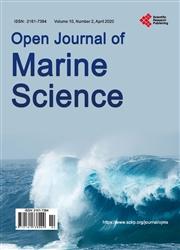Evaluation of MODIS Products in the Great Australian Bight and Adjacent Coastal Waters
引用次数: 1
Abstract
Satellite remote sensing data can produce global environmental data and is easily accessible and widely used by the scientific and non-scientific community. However, to use satellite data, it is important to know its limitations and how it validates against in situ measurements for the different regions. Here, field measurements of chlorophyll-a concentration and euphotic depth within the Great Australian Bight, Gulf St Vincent and Spencer Gulf were used to validate ocean colour products derived from the Moderate Resolution Imaging Spectroradiometer (MODIS) onboard the Aqua satellite. The field data include in situ and in vivo chlorophyll-a concentration, which were compared against MODIS chlorophyll-a products derived from three algorithms (OC3M, Carder, and Garver-Siegel-Maritorena (GSM)), as well as euphotic depth measurements derived from photosynthetically active radiation (PAR) profiles, which were compared against two MODIS euphotic depth products (derived semi-analytically and from surface chlorophyll-a). The OC3M product performed well in open waters, with errors below the 35% NASA accepted limit, but it overestimated chlorophyll-a values in shallow (<50 m) waters. The GSM product produced the lowest errors, but also showed a smaller dynamic range, while the Carder product produced higher errors than GSM and it also showed small dynamic range. The relationships between the MODIS and in situ euphotic depth were robust, with errors lower than 20%. MODIS products showed weaker or no significant relationships to in situ measurements in the Eastern Great Australian Bight. This is thought to be due to the summertime subsurface upwelling pool that is characteristic of the area. Based on these results, the OC3M product provides the most reliable estimates of chlorophyll-a, and is recommended for further applications of MODIS imagery, if the limitations in shallow waters are taken into account. Alternatively, the GSM product could be a better option if the algorithm were locally adjusted. Changes in the sampling methodology to improve the algorithms are discussed. Derived euphotic depth products can be used with confidence in applying MODIS products for monitoring water clarity, ecosystem health or primary productivity in the region.澳大利亚大湾及邻近沿海水域MODIS产品的评估
卫星遥感数据可以产生全球环境数据,科学界和非科学界很容易获得并广泛使用。然而,要使用卫星数据,重要的是要了解其局限性,以及它如何根据不同地区的现场测量进行验证。在这里,对大澳大利亚湾、圣文森特湾和斯宾塞湾的叶绿素a浓度和透光深度进行了实地测量,以验证Aqua卫星上的中分辨率成像光谱仪(MODIS)产生的海洋颜色产品。现场数据包括原位和体内叶绿素a浓度,将其与来自三种算法(OC3M、Carder和Garver-Siegel-Maritorena(GSM))的MODIS叶绿素a产物进行比较,以及来自光合活性辐射(标准杆数)谱的透光深度测量,将其与两种MODIS透光深度产物(半解析和表面叶绿素a得出)进行比较。OC3M产品在开放水域表现良好,误差低于美国国家航空航天局接受的35%的极限,但它高估了浅水(<50m)中的叶绿素a值。GSM产品产生的误差最低,但也显示出较小的动态范围,而Carder产品比GSM产生的误差更高,也显示出小的动态范围。MODIS与现场透光深度之间的关系是稳健的,误差低于20%。MODIS产品与东澳大利亚湾的现场测量显示出较弱或没有显著关系。这被认为是由于该地区特有的夏季地下上升流池。基于这些结果,OC3M产品提供了最可靠的叶绿素a估计值,如果考虑到浅水区的限制,建议用于MODIS图像的进一步应用。或者,如果对算法进行局部调整,GSM产品可能是更好的选择。讨论了采样方法的变化以改进算法。在应用MODIS产品监测该地区的水质清晰度、生态系统健康或初级生产力时,可以放心地使用衍生的透光深度产品。
本文章由计算机程序翻译,如有差异,请以英文原文为准。
求助全文
约1分钟内获得全文
求助全文

 求助内容:
求助内容: 应助结果提醒方式:
应助结果提醒方式:


